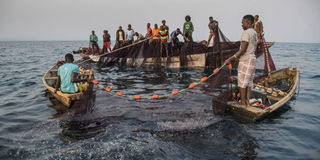Lake Tanganyika fishing ban boosts Tanzania's fish harvest by 55 percent

Dar es Salaam. Tanzania earned Sh324.85 billion from fishing products sourced from Lake Tanganyika between September and December 2024, marking a 55.3 percent increase compared to the same period in 2023, Parliament was informed.
During that time, 38,999.82 tonnes of fish were harvested, compared to 25,113.43 tonnes, valued at Sh166.47 billion, collected in 2023.
Livestock and Fisheries Deputy Minister, Mr Alexander Mnyeti, revealed these figures on Friday, April 25, 2025, in response to a question from Ms Aida Khenani, Nkasi North MP, Chadema.
Ms Khenani had asked about the positive outcomes of the three-month fishing ban on Lake Tanganyika.
Mr Mnyeti shared that beyond the 55.3 percent rise in fish harvest and revenue, the value of fish exports had also surged dramatically.
“Export reached Sh180.68 billion in 2024, up from Sh97.03 billion in 2023. This impressive 86.2 percent increase highlights the success of the ban in boosting the fisheries sector’s contribution to the national economy,” he said.
Mr Mnyeti explained that, according to experts, the increased harvests and exports not only indicate a healthier lake but also promise long-term benefits for food security and the livelihoods of local fishermen, who have benefited from the sustainable fishing practices promoted by the ban.
He further emphasized the government’s commitment to continuing efforts to protect and restore Lake Tanganyika, ensuring its resources can sustain future generations while supporting the national economy.
In her supplementary questions, Ms Khenani asked why the suspension had not been extended to other lakes and when alternative fishing methods would be introduced to alleviate the financial challenges faced by fishermen during the ban.
In his response, Mr Mnyeti mentioned that the government had sent 29 cages to the Lake Tanganyika regions, with 25 in Kigoma and two each in Katavi and Rukwa, respectively.
He assured that if Ms Khenani had groups of fishermen, the government would provide further support once manufacturing was complete.
Regarding the closure of all lakes, Mr Mnyeti explained that four countries involved with Lake Tanganyika had agreed to the ban, noting that the 2024 closure was the first for Tanzania, while neighboring countries had implemented similar closures multiple times.
He emphasized that the fishing suspension benefited both individual fishermen and the nation as a whole, countering claims from Ms Khenani that the ban had caused significant losses to fishing dealers around the lake.
Earlier, Mr Mnyeti had clarified that the three-month fishing ban on Lake Tanganyika took place from May 15 to August 15, 2024.
The ban was part of an agreement under the Lake Tanganyika Authority (LTA) framework, designed to help the lake’s ecosystem recover, improve fish spawning, and promote sustainable fishing practices.




